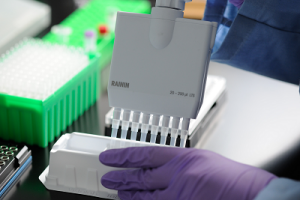 Before she was Foundation Medicine‘s (NSDQ:FMI) chief business executive, Melanie Nallicheri was as an advisor to an ongoing project at the Cleveland Clinic, where she was witness to the power of personalized cancer treatment.
Before she was Foundation Medicine‘s (NSDQ:FMI) chief business executive, Melanie Nallicheri was as an advisor to an ongoing project at the Cleveland Clinic, where she was witness to the power of personalized cancer treatment.
Her team was caring for a patient with glioblastoma – an extremely aggressive form of brain cancer with a median survival time of 15 months.
“The patient had resection and radiation and the question was: so now what?” she told Drug Delivery Business News.
They turned to the patient’s molecular profile in search of answers, scouring over millions of pieces of data. The goal was to find a clinical trial evaluating a drug that targeted the biomarkers present in the patient’s genetic makeup. Due in part to their efforts, the patient lived with his cancer for 18 months.
Fast forward nearly two decades later and personalized medicine is a well-known industry buzzword. Doctors are clamoring to get their hands on tools that will give them additional insight into their patients’ conditions and patients are desperate for more efficacious treatment options. The way scientists, doctors and patients think about cancer has evolved, Nallicheri said.

“We’ve finally understood cancer not to be one disease, but really hundreds, thousands of diseases,” she explained. “Every cancer patient’s tumor is unique. It’s unique because of where it originated and the alteration in the DNA that ultimately lead to that particular cancer in this particular patient.”
Instead of describing cancer based on its tissue of origin – like breast cancer, for example – Nallicheri sees the industry shifting to a definition guided by biomarkers.
“It’s most important to understand what drives [the cancer] and then to identify the treatment that is most appropriate for that particular patient,” she added.
In March, Foundation Medicine launched its CDx assay, a diagnostic test designed for patients with solid tumors. The system probes 324 genes to look for alterations that are linked to cancer growth. The test was also approved as a broad companion diagnostic for patients with non-small cell lung cancer, melanoma, colorectal cancer, breast cancer or ovarian cancer to help find those who could benefit from treatment with one of 17 on-label targeted therapies.
Foundation Medicine’s CDx test also interrogates other genomic biomarkers, like tumor mutational burden and microsatellite instability.
“They’re both very important biomarkers in the oncologist’s arsenal today to treat cancer,” Nallicheri said. She noted that Merck‘s (NYSE:MRK) immuno-oncology drug, Keytruda, won the first ’tissue-agnostic’ approval from the FDA last year – the drug is indicated for patients with tumors with high microsatellite instability, meaning the tumors’ underlying genetic makeup is predisposed to mutations.
Beyond developing and marketing these diagnostic tests, Foundation Medicine has established projects to help speed up the development of precision drugs, according to Nallicheri, including a database designed to inform clinical development programs for the biopharma industry.
“It’s really the market-leading database of its kind. Nobody has profiled more patients than we have,” she said.
The company has also established a set of services that help connect oncologists with clinical trials that are moving through the enrollment phase.

“I fundamentally believe that if we were only a company that put a test out there, that would be important and clearly is important. But what we’ve done goes so much further, because we are now taking the results of the more than 200,000 cancer patients that we have profiled and we are leveraging that data,” Nallicheri said.
But it will take more than just industry buzz to usher in the era of personalized medicine, she added.
“We need the test and it needs to be comprehensive. We need to be able to give an answer with one single sample or blood draw. We then need the reimbursement. And we need to create, from the data that we have, new therapy options and accelerate the creation of those new therapies, so that it becomes truly a virtual cycle. As we’re creating more options, there will be more testing. And as there will be more testing, we’ll create more insight and we create more therapy options. Hopefully, a few years from now the options for cancer patients will be vastly increased,” Nallicheri said.
